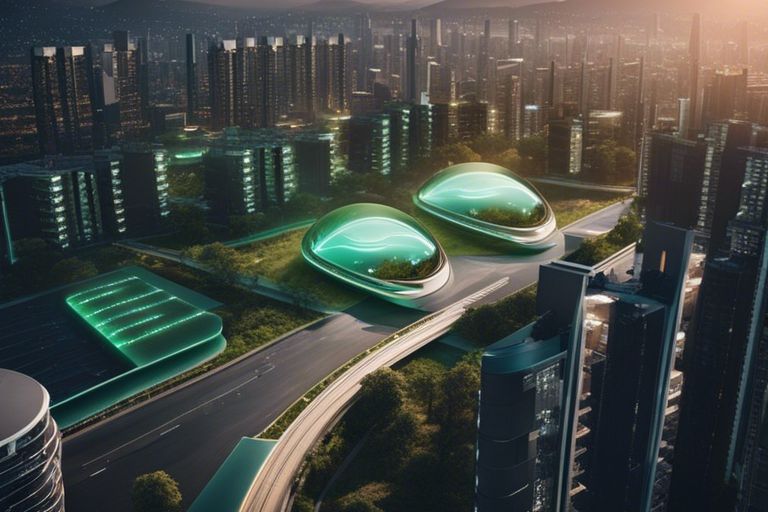With the advancement of artificial intelligence, cities around the world are harnessing the power of this innovative technology to drive smart city development. From improving traffic flow to enhancing public safety and optimizing energy consumption, AI is revolutionizing urban living. In this informative blog post, we will explore how artificial intelligence is shaping the future of smart cities and the benefits it brings to residents and local governments alike.

Key Takeaways:
- AI plays a crucial role in the development of smart cities: Artificial Intelligence serves as the backbone of smart city initiatives, enabling the integration and analysis of vast amounts of data to optimize city operations and services.
- AI enhances efficiency and sustainability in urban environments: By leveraging AI technologies, cities can improve energy consumption, transportation systems, waste management, and overall resource allocation, leading to a more sustainable and eco-friendly urban landscape.
- AI-driven smart cities prioritize citizen well-being and quality of life: The implementation of AI in smart city development aims to enhance public safety, health services, traffic management, and urban planning, ultimately focusing on improving the overall well-being and quality of life for residents.
AI in Urban Planning
To effectively incorporate artificial intelligence (AI) into urban planning, cities are leveraging technology to create more efficient and sustainable environments. AI algorithms analyze data from various sources to optimize city operations, improve citizen services, and enhance overall quality of life. By harnessing the power of AI, urban planners can make informed decisions to shape the future of smart cities.
- How can AI improve urban planning processes?
- What are the benefits of using AI in city development?
- The Use of AI for Smart Urban Services in Smart Cities
Optimizing Traffic Flow
Flow control of traffic is a crucial aspect of urban planning. AI algorithms can analyze traffic patterns, real-time data, and historical trends to optimize traffic flow, reduce congestion, and minimize travel times. By implementing smart traffic management systems powered by AI, cities can enhance mobility, improve air quality, and increase overall efficiency of transportation networks.
- How can AI be used to optimize traffic flow in cities?
- What are the benefits of using AI for traffic management?
- Improving traffic flow with AI technology
Predictive Maintenance of Infrastructure
On a large scale, AI can predict maintenance needs of critical infrastructure such as bridges, roads, and public buildings. By analyzing data on wear and tear, weather conditions, and usage patterns, AI systems can anticipate when repairs are needed, helping cities to prioritize maintenance tasks, prevent costly failures, and ensure the longevity of urban infrastructure.
- How does AI enable predictive maintenance of urban infrastructure?
- Benefits of implementing AI for predictive maintenance in cities
- Using AI to predict infrastructure maintenance needs
Understanding the role of AI in urban planning is necessary for the development of smart cities. By harnessing the power of artificial intelligence, cities can create more sustainable, efficient, and livable environments for their residents.
Smart City Infrastructure
Now, as we explore into smart city infrastructure, we encounter a system driven by connectivity, data, and artificial intelligence, shaping the urban landscape of the future. This network of interconnected technologies is revolutionizing how cities operate, from transportation to energy management, enhancing sustainability, efficiency, and citizen well-being.
1. How can AI optimize traffic flow in smart cities?
2. What role does AI play in managing infrastructure in a smart city?
3. Explain the concept of AI-powered predictive maintenance in urban infrastructure.
4. How can AI improve emergency response systems in smart cities?
Intelligent Transportation Systems
Infrastructure in smart cities incorporates intelligent transportation systems, leveraging AI to optimize traffic flow, reduce congestion, and enhance overall mobility. With real-time data analysis, predictive modeling, and smart routing algorithms, these systems are reshaping urban transportation, promoting sustainability and improving commuter experiences.
1. How does AI improve public transportation efficiency in smart cities?
2. Explain the role of AI in reducing carbon emissions through transportation management.
3. What are the benefits of AI-powered traffic signal control systems?
4. Discuss the impact of AI on autonomous vehicles in smart city environments.
Energy Efficiency through AI
Infrastructure powered by AI is driving significant advancements in energy efficiency within smart cities. By analyzing consumption patterns, optimizing energy usage, and integrating renewable sources, AI systems are helping cities reduce carbon footprints, lower costs, and build sustainable energy models for the future.
1. How can AI enhance energy management in buildings for improved efficiency?
2. Discuss the role of AI in optimizing energy distribution grids in smart cities.
3. Explain the concept of AI-driven demand response systems in energy management.
4. What are the challenges of implementing AI for energy efficiency in urban environments?
Infrastructure in smart cities is not just about physical structures but extends to the intelligent systems that power them. Energy efficiency through AI is a crucial component of sustainable urban development, enabling cities to optimize resource utilization, reduce environmental impact, and create more resilient communities. By harnessing the power of artificial intelligence, cities can build a foundation for a greener, smarter future.

Enhancing Public Services
All technological advancements are aimed at making public services more efficient and accessible. Artificial Intelligence plays a crucial role in enhancing public services by optimizing processes, improving decision-making, and increasing citizen satisfaction. Below are some chatGPT prompt samples related to this subsection:
- How can AI improve public transportation systems in smart cities?
- Discuss the role of AI in enhancing emergency response systems.
- What are the benefits of using AI for urban planning and resource allocation in smart cities?
AI-powered Waste Management
AI-powered waste management systems utilize sensors and data analytics to optimize waste collection routes, reduce operational costs, and minimize environmental impact. These systems enable cities to efficiently manage waste disposal processes, leading to cleaner and healthier urban environments. Below are some chatGPT prompt samples related to this subsection:
- How can AI be used to improve recycling rates in smart cities?
- Discuss the role of AI in reducing landfill waste through intelligent waste management systems.
- What are the environmental benefits of implementing AI-powered waste sorting technologies?
Intelligent Healthcare Systems
Intelligent healthcare systems leverage AI to enhance medical services, improve patient care, and optimize healthcare operations. These systems can assist in diagnosing diseases, personalizing treatment plans, and predicting outbreaks, ultimately leading to better health outcomes for residents. Below are some chatGPT prompt samples related to this subsection:
- How can AI improve patient monitoring and care coordination in healthcare systems?
- Discuss the applications of AI in medical imaging for disease diagnosis and treatment.
- What are the ethical considerations surrounding the use of AI in healthcare practices?
Intelligent healthcare systems integrate AI algorithms into medical processes to streamline operations, enhance diagnostics, and improve patient care. These systems can analyze vast amounts of patient data to identify trends, predict health outcomes, and recommend personalized treatment plans. By harnessing the power of AI, healthcare providers can deliver more efficient and effective services to their communities, transforming the way healthcare is delivered in smart cities.

Challenges and Opportunities
Keep iterating on AI models to improve efficiency and accuracy in smart city applications. Embrace the potential for AI to enhance urban planning, resource management, and public services. Leverage AI algorithms to analyze large datasets for better decision-making in city governance.
1. How can AI be utilized to optimize traffic flow in smart cities?
2. What are the challenges of integrating AI systems with existing city infrastructure?
3. Can AI help in reducing energy consumption and promoting sustainability in urban areas?
Addressing Cybersecurity Concerns
Cybersecurity remains a key concern in the deployment of AI systems in smart cities. Ensuring data privacy, protecting against cyberattacks, and maintaining system integrity are vital for the successful implementation of AI-driven solutions in urban environments.
1. How can AI systems be safeguarded from potential cyber threats in smart city environments?
2. What measures should be taken to protect sensitive data collected by AI sensors in urban settings?
3. Are there AI-based solutions available to enhance cybersecurity in smart city infrastructures?
Ensuring Transparency and Accountability
Opportunities exist to foster transparency and accountability in smart city initiatives through AI. Implementing clear guidelines for data collection, processing, and decision-making can enhance public trust and ensure responsible use of AI technologies in urban development.
1. How can AI algorithms be designed to provide explanations for their decisions in smart city applications?
2. What role does transparency play in ensuring the ethical deployment of AI in urban planning?
3. Are there frameworks available to promote accountability and fairness in AI-driven smart city projects?
The integration of AI in smart city development presents a dual challenge and opportunity for cities worldwide. While advancements in AI technology hold vast potential to improve efficiency and sustainability in urban environments, addressing cybersecurity concerns and ensuring transparency and accountability are paramount to building trust and safeguarding the rights of citizens.
This integration requires a delicate balance between harnessing the power of AI for positive transformation and mitigating the risks associated with its implementation. City planners and policymakers must navigate these challenges thoughtfully to create smarter, more inclusive, and secure urban spaces for future generations.
Summing up
So, as explored in the article “Artificial Intelligence – Driving Smart City Development,” it’s clear how AI is a key player in the advancement of smart cities. Through its ability to analyze data and optimize processes, AI is improving efficiency, sustainability, and overall quality of life in urban areas. As technology continues to evolve, incorporating AI into city planning will undoubtedly lead to more innovative and interconnected communities.
FAQ
Q: What is the role of Artificial Intelligence in driving smart city development?
A: Artificial Intelligence plays a crucial role in driving smart city development by enabling data-driven decision-making, optimizing resource allocation, and enhancing the overall efficiency and sustainability of urban systems.
Q: How does Artificial Intelligence improve urban infrastructure in smart cities?
A: Artificial Intelligence enhances urban infrastructure in smart cities by enabling predictive maintenance of critical systems, optimizing traffic flow, managing energy consumption, and improving public safety through advanced analytics and automation.
Q: What are some examples of Artificial Intelligence applications in smart city development?
A: Examples of Artificial Intelligence applications in smart city development include smart traffic management systems, intelligent energy grids, predictive policing algorithms, automated waste management solutions, and AI-powered healthcare services for residents.

Recent Comments